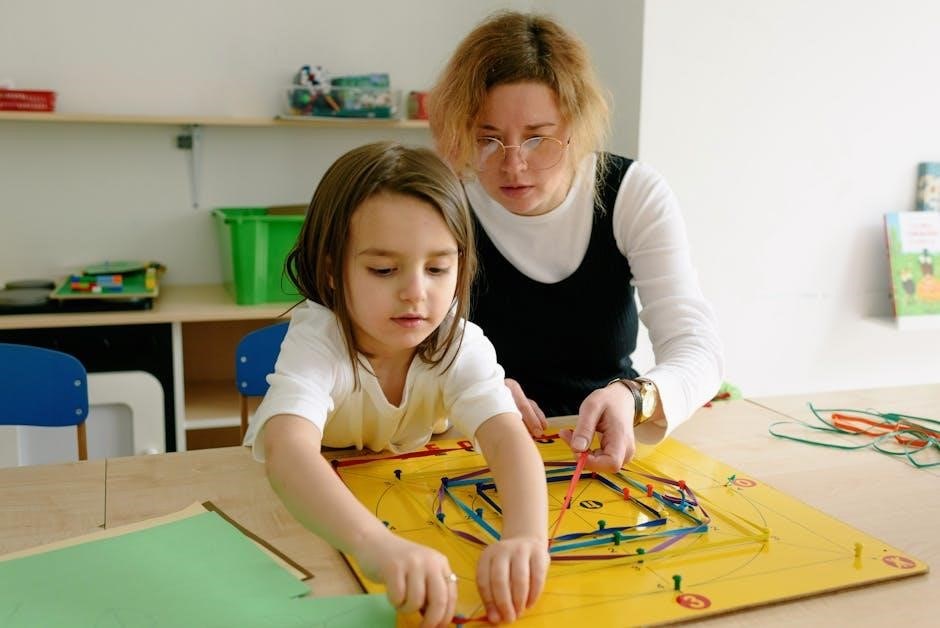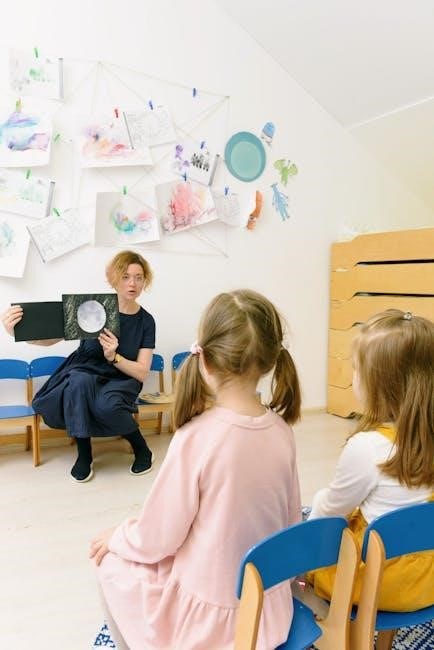Kindergarten math lesson plans are essential for building foundational skills through play-based learning and interactive activities, fostering number sense and problem-solving abilities in young learners effectively․
Overview of the Importance of Early Math Education
Early math education lays the groundwork for future academic success, fostering problem-solving skills, logical thinking, and number sense․ Research shows that math competence in kindergarten predicts long-term math achievement, emphasizing its critical role in a child’s developmental journey․ Play-based learning and interactive activities make math engaging, helping children build confidence and a strong foundation for lifelong learning․ Consistent, structured lessons ensure comprehensive skill development and prepare young learners for challenges ahead․

Key Components of Effective Kindergarten Math Lesson Plans
Effective kindergarten math lesson plans include structured curriculum guides, hands-on activities, technology integration, and parent-teacher collaboration, ensuring comprehensive skill coverage and engagement for diverse learners․
Age-Appropriate Activities for Skill Development
Engaging, age-appropriate activities are crucial for fostering math skills in kindergartners․ Play-based learning, such as counting games, puzzles, and hands-on manipulatives, promotes number sense and problem-solving abilities․ These activities are tailored to a child’s developmental stage, ensuring they are both challenging and achievable․ By incorporating fun, interactive exercises, teachers can help young learners build a strong foundation in mathematics while keeping them motivated and excited about learning․
Integration of Play-Based Learning
Play-based learning is a cornerstone of effective kindergarten math lesson plans, as it engages young learners through interactive and enjoyable activities․ By incorporating games, puzzles, and manipulatives, children develop essential math skills like counting, sorting, and problem-solving․ This approach fosters curiosity and creativity, making math a fun and accessible subject․ Playful learning environments encourage active participation, helping children build a strong mathematical foundation while maintaining their natural love for exploration and discovery․

Teaching Math Through Everyday Interactions
Math becomes meaningful when woven into daily routines, turning ordinary activities into learning opportunities that foster number sense, counting, and problem-solving skills in a natural, engaging way․
How to Make Math Part of Daily Routines
Incorporate math into daily activities like mealtime, chores, and play․ Count fruits, discuss shapes during walks, or measure ingredients while cooking․ Use number rhymes and songs during car rides․ Encourage children to notice patterns on clothing or in nature․ Turn bath time into a sorting game with rubber ducks or cups․ These moments make math fun, relevant, and seamlessly integrated into a child’s natural learning environment, fostering a strong foundation for future skills․
Encouraging Number Sense and Counting Skills
Engage children in play-based activities like counting games, rhymes, and puzzles to build number sense․ Use visual aids such as number lines, counting blocks, and real-world objects to demonstrate concepts․ Encourage them to count aloud during routines, like arranging toys or climbing stairs․ Incorporate movement, such as jumping or clapping, to make counting interactive․ Celebrate their progress and provide opportunities for practice through fun, repetitive exercises that reinforce foundational math skills․

Parental Involvement in Kindergarten Math
Parents play a vital role by collaborating with teachers, reinforcing math skills through daily interactions, and creating a supportive environment that fosters a love for learning math․
Simple Home Activities to Reinforce Learning
Engage your child in daily math activities like counting during walks, using household items for sorting, and measuring ingredients while baking․ Encourage number recognition through games like “I Spy” with numbers or shapes․ Create a DIY number line using stickers or stamps to practice sequencing․ Incorporate math into routines, such as counting spoons during meals or discussing time concepts․ These fun, interactive methods reinforce classroom learning and make math a part of everyday life․
Communicating with Teachers for Consistency
Maintaining regular communication with your child’s teacher ensures alignment between home and classroom learning․ Share your child’s progress, strengths, and interests to tailor activities․ Discuss any advanced skills, like reading or math, to adapt lesson plans․ Consistency in teaching methods and expectations supports your child’s growth․ Regular updates and collaborative efforts create a cohesive learning environment, fostering confidence and continuity in math skills development․

Downloadable Resources for Kindergarten Math
Downloadable kindergarten math resources, including PDF lesson plans and educational apps, provide teachers with effective, structured tools to create engaging, comprehensive math lessons with interactive and visual learning aids․
Popular PDF Lesson Plans Available Online
Popular PDF lesson plans for kindergarten math are widely available online, offering a variety of hands-on activities, number sense exercises, and interactive games․ These structured guides provide comprehensive skill coverage, from counting and shapes to basic arithmetic, making them ideal for teachers and parents seeking engaging, easy-to-implement resources․ Many plans emphasize play-based learning and real-world applications, ensuring a fun and effective approach to early math education while reinforcing foundational skills consistently․
Benefits of Using Structured Curriculum Guides
Structured curriculum guides for kindergarten math offer consistent and comprehensive skill development, ensuring alignment with educational standards․ They provide clear objectives, activities, and assessments, helping teachers track progress effectively․ These guides also support parent-teacher collaboration, reinforcing learning at home․ By following a structured approach, children build confidence and a strong foundation in math, preparing them for future academic success in a organized and engaging manner․

Assessment and Progress Tracking
Effective kindergarten math assessments use playful methods and observations to monitor skill development, ensuring personalized instruction and tracking progress in a engaging and child-centered approach․
Monitoring Development Through Playful Methods
Playful assessments allow teachers to observe math skills naturally, fostering creativity and problem-solving․ Activities like block building and number games reveal understanding without formal tests, making learning enjoyable and engaging․ These methods help track progress, identify strengths, and pinpoint areas needing support, ensuring tailored instruction that aligns with each child’s developmental pace and learning style, while maintaining their intrinsic motivation and curiosity about math concepts․
Using Observations to Guide Instruction
Observations are a powerful tool for understanding children’s math development․ By watching students engage in activities, teachers can identify strengths, areas needing support, and cognitive growth․ These insights allow for tailored instruction, ensuring lessons are engaging and relevant․ Observing problem-solving strategies and number sense helps guide future planning, fostering a deeper understanding of math concepts and promoting a love for learning through personalized and effective teaching methods․

Creative Math Centers and Group Activities
Creative math centers and group activities provide hands-on experiences, fostering collaboration and problem-solving․ These engaging setups make learning math fun and accessible for young learners․
Designing Engaging Math Centers
Engaging math centers are designed to captivate young learners through hands-on activities and visual aids․ By incorporating manipulatives, games, and themed stations, these centers foster problem-solving and collaboration․ Organizing centers around specific skills, such as counting or shapes, ensures focused learning․ Play-based elements, like puzzles and sorting games, make math enjoyable and interactive, while colorful displays and clear instructions keep students motivated and on track․
Small Group Activities for Diverse Learners
Small group activities cater to diverse learners by providing personalized attention and tailored instruction․ These sessions allow teachers to address varying skill levels and learning styles through hands-on tasks and collaborative problem-solving․ Interactive games, manipulatives, and themed challenges encourage engagement while fostering math skills․ This approach ensures every child, regardless of ability, can participate meaningfully and build confidence in their mathematical understanding through active, guided practice․

Aligning Lesson Plans with Educational Standards
Aligning kindergarten math lesson plans with educational standards ensures comprehensive skill coverage and prepares children for future academic success by meeting state and national math expectations effectively․
Understanding State and National Math Standards
State and national math standards provide clear guidelines for teaching foundational skills like counting, basic operations, and shape recognition․ These standards ensure consistency and progression in math education, preparing children for future academic challenges․ By aligning lesson plans with these benchmarks, educators can create structured, goal-oriented activities that foster a strong mathematical foundation․ Resources like illustrated guides offer practical lesson ideas to support these standards effectively․
Ensuring Comprehensive Skill Coverage
Effective kindergarten math lesson plans ensure comprehensive skill coverage by incorporating activities that address counting, basic operations, shape recognition, and number sense․ Hands-on tasks and group work encourage problem-solving and creativity, building a strong mathematical foundation․ These structured plans help children master essential skills progressively, fostering confidence and readiness for advanced concepts in later grades through engaging and developmentally appropriate practices․

Technology Integration in Math Lessons
Technology enhances kindergarten math lessons through educational apps and interactive tools, providing visual learning experiences that make concepts engaging and accessible for young students․
Educational Apps for Kindergarten Math
Educational Apps for Kindergarten Math
Educational apps like Khan Academy Kids and PBS Kids offer interactive math games, puzzles, and activities tailored for kindergartners․ These apps feature colorful visuals, engaging rewards, and hands-on exercises that teach counting, shapes, and basic addition․ They align with curriculum goals, providing a fun way to practice skills at home or in the classroom, while reinforcing early math concepts through play-based learning experiences․
Interactive Tools for Visual Learning
Interactive tools like digital whiteboards and math-focused websites provide visual aids to teach counting, shapes, and patterns․ These tools use animations and graphics to make math concepts engaging․ Many apps and online platforms offer customizable activities that align with kindergarten lesson plans, helping children grasp abstract ideas through hands-on, visual experiences․ These resources complement traditional teaching methods, enhancing understanding and retention in a visually appealing way for young learners․
Structured kindergarten math lesson plans provide a valuable framework for building foundational skills through play and interaction, fostering confidence and a lifelong love for mathematics․
Summarizing the Value of Structured Lesson Plans
Structured kindergarten math lesson plans are essential for creating consistency and engagement in learning․ They provide a clear framework for teachers to deliver content effectively, ensuring foundational math skills are developed․ By incorporating play-based activities and real-world applications, these plans help children build problem-solving abilities and a strong number sense, laying the groundwork for future academic success in mathematics․